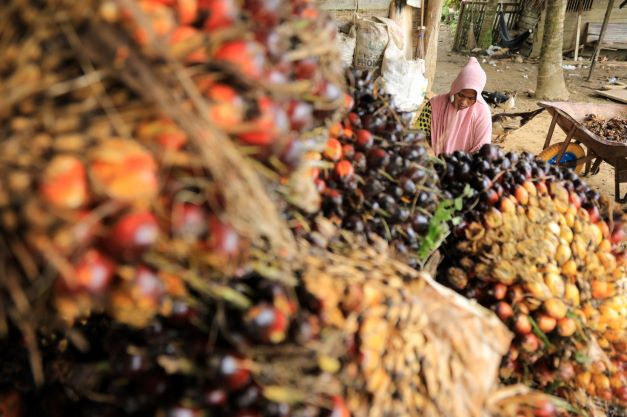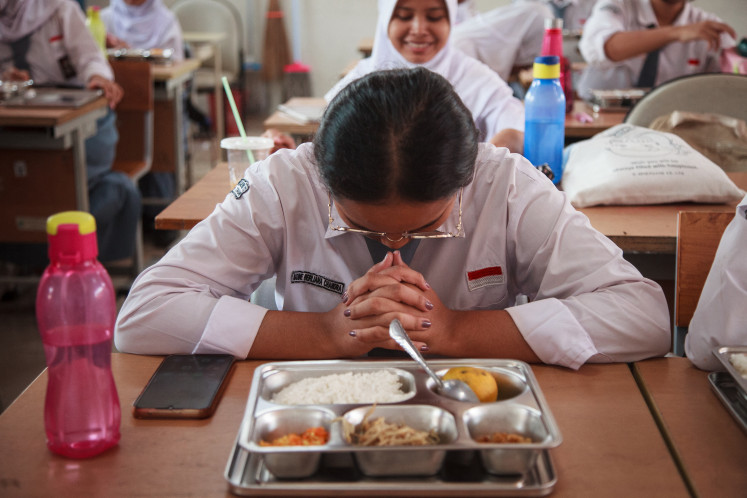Popular Reads
Top Results
Can't find what you're looking for?
View all search resultsPopular Reads
Top Results
Can't find what you're looking for?
View all search resultsIndonesia widens export ban to include CPO, refined palm oil
The announcement was a reversal of the minister's statement a day earlier, in which he had said the export ban would only cover refined, bleached, and deodorized (RBD) palm olein.
Change text size
Gift Premium Articles
to Anyone
I
ndonesia widened the scope of its export ban on raw materials for cooking oil to include crude and refined palm oil, among other products, its chief economic minister said on Wednesday, just hours before the restriction comes into force.
The announcement was a reversal of the minister's statement a day earlier, in which he had said the export ban would only cover refined, bleached, and deodorized (RBD) palm olein.
The change was "in line with the president's decision and after taking into account the feedback and views from the people," Coordinating Economic Minister Airlangga Hartarto said in a short statement.
President Joko "Jokowi" Widodo said in a separate statement that people's need for affordable food trumped revenue concerns for now.
"Once domestic needs have been met, of course I will lift the export ban because I know the country needs taxes, the country needs foreign exchange, the country needs a trade balance surplus, but meeting the people's basic needs is a more important priority," he said.
Palm oil markets have been jittery ahead of the ban and Indonesia deployed navy ships and personnel in an effort to thwart illegal shipments.
The new rules were due to take effect at midnight local time (1700 GMT), and the navy and other agencies had been instructed to step up patrols of Indonesian waters to ensure compliance, said Indonesian Navy spokesperson Rear Adm. Julius Widjojono.
Palm oil futures on the Malaysia exchange surged by 9.8 percent on Wednesday, as some market participants feared exporters in Indonesia, the world's biggest palm oil producer, could not get their products onboard vessels in time before the ban starts.
It was unclear if palm oil companies had been informed of the latest policy change.
Eddy Martono, secretary general of the Indonesia Palm Oil Association (GAPKI), earlier on Wednesday said the industry was trying to "operate as usual while continuing to monitor market movements".
Eddy said that with such short notice on the ban, first announced by President Jokowi on Friday evening, there was no way exporters could rush their products out.
"Its impossible to get a vessel instantly, everything would've been chartered," he said.
Indonesia's restrictions have driven up global edible oil prices as supplies were already choked by factors like drought and shortages after Russia's invasion of major crop producer Ukraine.
Indonesia's ban on palm oil exports is unlikely to last more than a month due to limited infrastructure to store the surplus oil and because of mounting pressure from buyers to resume shipments, industry officials said.
Stubbornly high prices
The ban would remain in place until prices of bulk cooking oil dropped to Rp 14,000 ($0.9720) per liter, Airlangga said.
In Jakarta, bulk cooking oil prices were offered at around Rp 19,000 to 20,000 per liter on Wednesday and in other regions prices could be higher, said Indonesian Traditional Market Traders Association (IKAPPI) spokesperson Reynaldi Sarijowan.
In Riau province on Sumatra, small farmers already saw a drastic drop in price of palm oil fruits due to the export ban, local planters said, and they fear that palm oil companies will stop buying from independent farmers.
GAPKI's Eddy said that in 2021, domestic consumption of RBD palm olein was 8.3 million tons and Indonesia may face storage issues if the ban is prolonged.
Last year, Indonesia produced nearly 47 million tons of crude palm oil, according to GAPKI data.











